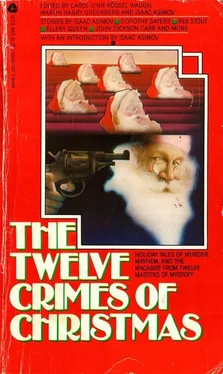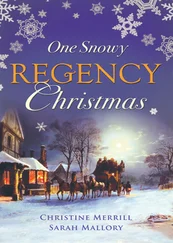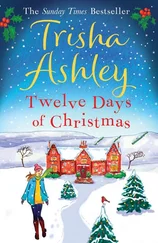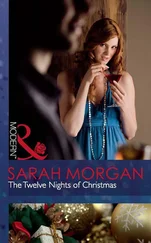Carol-Lynn Waugh - The Twelve Crimes of Christmas
Здесь есть возможность читать онлайн «Carol-Lynn Waugh - The Twelve Crimes of Christmas» весь текст электронной книги совершенно бесплатно (целиком полную версию без сокращений). В некоторых случаях можно слушать аудио, скачать через торрент в формате fb2 и присутствует краткое содержание. Жанр: Триллер, на английском языке. Описание произведения, (предисловие) а так же отзывы посетителей доступны на портале библиотеки ЛибКат.
- Название:The Twelve Crimes of Christmas
- Автор:
- Жанр:
- Год:неизвестен
- ISBN:нет данных
- Рейтинг книги:3 / 5. Голосов: 1
-
Избранное:Добавить в избранное
- Отзывы:
-
Ваша оценка:
- 60
- 1
- 2
- 3
- 4
- 5
The Twelve Crimes of Christmas: краткое содержание, описание и аннотация
Предлагаем к чтению аннотацию, описание, краткое содержание или предисловие (зависит от того, что написал сам автор книги «The Twelve Crimes of Christmas»). Если вы не нашли необходимую информацию о книге — напишите в комментариях, мы постараемся отыскать её.
The Twelve Crimes of Christmas — читать онлайн бесплатно полную книгу (весь текст) целиком
Ниже представлен текст книги, разбитый по страницам. Система сохранения места последней прочитанной страницы, позволяет с удобством читать онлайн бесплатно книгу «The Twelve Crimes of Christmas», без необходимости каждый раз заново искать на чём Вы остановились. Поставьте закладку, и сможете в любой момент перейти на страницу, на которой закончили чтение.
Интервал:
Закладка:
Roy glanced at Mary Jordon. She was sobbing in frustration as Pederson edged her towards the door. “Tell him not to try too hard, will you?”
THE PROBLEM OF THE CHRISTMAS STEEPLE by Edward D. Hoch
A full-time writer since 1968, Ed Hoch is certainly one of the two or three most prolific fiction writers in the United States, with some six hundred stories in the mystery genre. He is best known for four series detectives: Rand, a British cipher expert; Nick Velvet, a most original thief; Simon Ark, a mystical detective; and Captain Leopold, perhaps the best-known of his creations. Mr. Hoch is a winner of the Mystery Writers of America’s highest award, the Edgar.
“Like I was sayin’ last time,” Dr. Sam Hawthorne began, getting down the brandy from the top shelf, “the year 1925 was a bad one for murder and other violent crimes. And just about the worst one o’ them all came on Christmas Day, when the year was almost over. Here, let me pour you a small-ah-libation before I start…”
It had been a quiet fall in Northmont since the kidnapping and recovery of little Tommy Belmont. In fact, about the biggest news around town was that the new Ford dealer over in Middle Creek would soon be selling dark green and maroon cars along with the traditional black ones.
“You see, Dr. Sam,” my nurse April said, “pretty soon you won’t be the only one round these parts with a bright yellow car.”
“Dark green and maroon are a long way from yellow,” I reminded her. Kidding me about my 1921 Pierce-Arrow Runabout was one of her favorite sports. My first winter in Northmont I’d put the Runabout up on blocks and driven a horse and buggy on my calls, but now I was gettin’ a bit more venturesome. As long as the roads were clear I drove the car.
This day, which was just two weeks before Christmas, April and I were drivin’ out to visit a small gypsy encampment at the edge of town. The traditionally cold New England winter hadn’t yet settled in, and except for the bareness of the tree limbs it might have been a pleasant September afternoon.
The gypsies were another matter, and there wasn’t much pleasant about their encampment. They’d arrived a month earlier, drivin’ a half-dozen horse-drawn wagons, and pitched their tents on some unused meadowland at the old Haskins farm. Minnie Haskins, widowed and into her seventies, had given them permission to stay there, but that didn’t make Sheriff Lens and the townsfolks any happier about it. On the few occasions when gypsies had appeared at the general store to buy provisions, they’d been treated in a right unfriendly manner.
I’d gone out to the encampment once before to examine a sick child, and I decided this day it was time for a return visit. I knew there wasn’t much chance of gettin’ paid, unless I was willin’ to settle for a gypsy woman tellin’ April’s fortune, but still it was somethin’ I felt bound to do.
“Look, Dr. Sam!” April said as the gypsy wagons came into view. “Isn’t that Parson Wigger’s buggy?”
“Sure looks like it.” I wasn’t really surprised to find Parson Wigger visiting the gypsies. Ever since coming to town last spring as pastor of the First New England Church he’d been a controversial figure. He’d started by reopening the old Baptist church in the center of town and announcin’ regular services there. He seemed like a good man who led a simple life and looked for simple solutions-which was why so many people disliked him. New Englanders, contrary to some opinions, are not a simple folk.
“Mornin’, Dr. Sam,” he called out as he saw us drive up. He was s tan din’ by one of the gypsy wagons, talkin’ to a couple of dark-haired children. “Mornin’, April. What brings you two out here?”
“I treated a sick boy a while back. Thought I’d see how he’s coming along.” I took my bag from the car and started over. Already I recognized my patient, Tene, as one of the boys with the parson. “Hello, Tene, how you feeling?”
He was around eleven or twelve, and shy with non-gypsy gadjo like myself. “I’m okay,” he said finally.
“This the boy was sick?” Parson Wigger asked.
I nodded. “A throat infection, but he seems to be over it.”
At that moment Tene’s father appeared around the side of the wagon. He was a dark brooding man with a black mustache and hair that touched the top of his ears, leaving small gold earrings exposed. Though Parson Wigger was the same size and both men looked to be in their mid-thirties, they could hardly have been more different. Except for an old arm injury which had left him with a weak right hand, Carranza Lowara was the picture of strength and virility. By contrast Wigger gave the impression of physical weakness. The parson’s hair was already thinning in front, and he wore thick eyeglasses to correct his faulty vision.
“You are back, Doctor?” Tene’s father asked.
“Yes, Carranza, I am back.”
He nodded, then glanced at April. “This is your wife?”
“No, my nurse. April, I want you to meet Carranza Lowara. He is the leader of this gypsy band.”
April took a step forward, wide-eyed, and shook his hand. “Pleased to meet you.”
“I’m trying to help these people get settled for the winter,” Parson Wigger explained. “These wagons are hardly good shelter for twenty people. And the two tents are not much better.”
“We have lived through the winters before,” Carranza Lowara said. He spoke English well, but with an accent I hadn’t been able to place. I supposed it must be middle European.
“But not in New England.” The parson turned to me and explained. “They came up from the south, as do most gypsies. I’ve encountered them before in my travels. Spain deported gypsies to Latin America hundreds of years ago, and they’ve been working their way north ever since.”
“Is that true?” I asked Lowara. “Do you come from Latin America?”
“Long, long ago,” he replied.
I happened to glance back at my car and saw a gypsy woman in a long spangled skirt and bare feet. She was examining my car intently. I’d seen her on my previous visit, and suspected she was Lowara’s wife or woman. “Is she of your family?” I asked.
“Come here, Volga.” The woman came over promptly, and I saw that she was younger than I’d first supposed. Not a child, certainly, but still in her twenties. She was handsomer than most gypsy women, with high cheekbones and slightly slanted eyes that hinted at a mixture of Oriental blood. I introduced her to April, and they went off together to visit the other wagons.
“She is my wife,” Lowara explained.
“Tene’s mother?”
“Yes.”
“She seems so young.”
“Gypsy women often marry young. It is a custom. You should come to a gypsy wedding sometime and see the groom carry off the bride by force. It is not like your Christian weddings, Parson.”
“I imagine not,” Parson Wigger replied dryly. “But I will come to a gypsy wedding only if you honor me with your presence at my church.”
The gypsy shook his head. “Your townspeople do not like us.”
“They might like you more if they saw you attending Christian services.”
Lowara shrugged. “We have no religion. We would as soon go to your church as any other.”
“Come, then, on Christmas Day. It’s just two weeks away. Once you know the people and are friendly with them, you might even find an old barn to stay the winter.”
“Would a barn be any warmer than our tents? I think not.”
“Come anyway,” the parson pleaded. “You won’t regret it.”
The gypsy nodded. “I will talk to the others. I think you will see us in two weeks.”
Parson Wigger walked me back to my Runabout “I think their appearance on Christmas morning will have a good effect on the townspeople. No one can hate a fellow Christian on Christmas.”
Читать дальшеИнтервал:
Закладка:
Похожие книги на «The Twelve Crimes of Christmas»
Представляем Вашему вниманию похожие книги на «The Twelve Crimes of Christmas» списком для выбора. Мы отобрали схожую по названию и смыслу литературу в надежде предоставить читателям больше вариантов отыскать новые, интересные, ещё непрочитанные произведения.
Обсуждение, отзывы о книге «The Twelve Crimes of Christmas» и просто собственные мнения читателей. Оставьте ваши комментарии, напишите, что Вы думаете о произведении, его смысле или главных героях. Укажите что конкретно понравилось, а что нет, и почему Вы так считаете.












